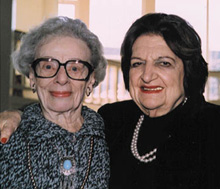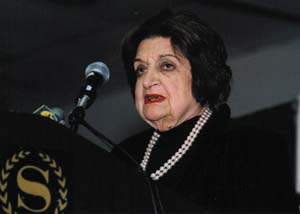Thomas and Aiken: Stepping Up to the Plate
by Deb Alden
Photos by Chris Bretschneider
 There
is no road map to follow when striking out for uncharted territory, there’s
just a burning need to get the job done. The greatest women have followed
a goal, and blazed a new path. For Helen Thomas, that goal was reporting,
and the only hub for real news was Washington. "I had wonderful parents
who didn’t tell me that it was a man’s world," Thomas
says. "Nobody ever told me that I couldn’t go into reporting."
Still, the lessons to come were hard ones. "When I came to Washington,
every door was closed to women. We had to break down every door one by
one." Getting equal access to the news, to the heart of the White
House, became her driving goal. "I’ve been very selfishly motivated,"
she says. "I just wanted to be there." There
is no road map to follow when striking out for uncharted territory, there’s
just a burning need to get the job done. The greatest women have followed
a goal, and blazed a new path. For Helen Thomas, that goal was reporting,
and the only hub for real news was Washington. "I had wonderful parents
who didn’t tell me that it was a man’s world," Thomas
says. "Nobody ever told me that I couldn’t go into reporting."
Still, the lessons to come were hard ones. "When I came to Washington,
every door was closed to women. We had to break down every door one by
one." Getting equal access to the news, to the heart of the White
House, became her driving goal. "I’ve been very selfishly motivated,"
she says. "I just wanted to be there."
Do What it Takes
To be in the White House, reporting the news of the nation, was no easy
matter. Thomas, like Aiken, counsels women to do what it takes to get
where you are going. For Thomas, that meant radio news for UPI for seven
years while she waited for her break. She was at the absolute bottom of
the news agency once the men returned from war, yet she did her job well
and unfailingly. Aiken, too, came in at the bottom when she arrived in
Washington. She was the only hire from Vermont to go to the new senator’s
office. She had been hired by top aide Jean Douglas to serve as her secretary
while Senator Aiken retained the rest of the former senator’s staff.
"I was very lonely that first year," Aiken recalls. "I
didn’t know anyone and I missed Vermont terribly. That first year
all I did, literally, was get to know the people who worked in the lower
levels of the Senate Office Building — the furniture men, the maintenance
people. They know everything that is going on." Aiken’s break
came when fellow boarders in the rooming house — all democrats,
"I was the only Republican in that rooming house," she says
— turned to her to fill a vacancy on the bowling team. That was
the start of a series of connections that would have Aiken elbow-to-elbow
with all of the key journalists and politicians of Washington for the
next 34 years. "That is a wonderful education," she says of
time spent with the brightest, most inquisitive minds. "I was always
in the position where I was learning, learning, learning." Thomas,
too, positioned herself to absorb all that she could in terms of experience
so that she could put it to use when her opportunity arose.
Thomas’ ticket came in the form of a lowly news assignment —
she was sent to cover the news of the newly arrived Kennedy children in
the White House. Like Aiken, Thomas was quick to realize that every situation
can become an opportunity. Before long, Thomas was a regular face in the
family entourage. Entrée to the White House meant access to information.
Reporting on Carolyn’s pet hamster was the means to that end, as
was making the coffee every morning in the pressroom. Say yes to the small
jobs, both women say, for they are your stepping-stones.
Neither Thomas nor Aiken had money to burn. Each existed on a meager
salary in hopes of translating the experience into greater opportunities.
For Aiken, hard work paid off. When Douglas joined the Navy during World
War II, Senator Aiken tried replacing her with a string of lawyers. In
the end, he called Lola in to say, "You’re doing the work,
you might as well get the pay and the title." From that day on, she
served as administrative assistant to the Senator, a job that took her
to the United Nations for 3 months, and though all of the halls and parlors
of power in Washington.
The going was harder for Thomas who had to create each and every opportunity
for herself. First came the visit from Khrushchev in 1959. Excluded for
the Press Club, women journalists were not going to be included in the
briefing. They enlisted Khrushchev’s help, however, and were allowed
select admittance (1.5 women for every ten men) to the briefing. "For
the first time in history," Thomas says, "they allowed 30 women
to sit on the floor with their male colleagues." It was a start,
and Thomas was there. Still, it was not until 1971 that women journalists
were admitted as members to the Press Club. "I couldn’t believe
the discrimination against women," Thomas says. "Then I saw
the discrimination against blacks, and there was just no comparison."
Passion Fuels Purpose
 Thomas
continued to slog away at assignments and break down the walls of discrimination
brick by brick. Her determination to make a difference, to use truth to
bring about change, has never faltered. "I think I’ve always
been outraged at injustice," Thomas says. "That’s been
my adrenaline." But she knew where the lines between passion and
professionalism were drawn and always maintained them. "I put my
ideas and opinions in a blind tryst while I was at the White House,"
she says. "But everywhere else I bitched and screamed. Everyone knew
where I stood." At work, however, her job was to get the facts. No
matter how difficult the situation, no matter how mean she might look
while hammering away at a president or press secretary while pushing for
an answer, Thomas’ job was to question the only direct representative
of the presidency and disengage those answers for the American public.
That meant asking tough questions about Vietnam, Watergate, assassinations,
overseas dealings, alliances, and the numbers of soldiers killed or wounded
in action. "I believe there is no question that should not be asked,
and no question that cannot be asked politely," Thomas says. The
role of the press is to ask the questions until they get an answer. "The
White House Press Room is the only place where we are allowed to question
the President directly," Thomas stresses. It is the journalists’
responsibility to do so. Thomas
continued to slog away at assignments and break down the walls of discrimination
brick by brick. Her determination to make a difference, to use truth to
bring about change, has never faltered. "I think I’ve always
been outraged at injustice," Thomas says. "That’s been
my adrenaline." But she knew where the lines between passion and
professionalism were drawn and always maintained them. "I put my
ideas and opinions in a blind tryst while I was at the White House,"
she says. "But everywhere else I bitched and screamed. Everyone knew
where I stood." At work, however, her job was to get the facts. No
matter how difficult the situation, no matter how mean she might look
while hammering away at a president or press secretary while pushing for
an answer, Thomas’ job was to question the only direct representative
of the presidency and disengage those answers for the American public.
That meant asking tough questions about Vietnam, Watergate, assassinations,
overseas dealings, alliances, and the numbers of soldiers killed or wounded
in action. "I believe there is no question that should not be asked,
and no question that cannot be asked politely," Thomas says. The
role of the press is to ask the questions until they get an answer. "The
White House Press Room is the only place where we are allowed to question
the President directly," Thomas stresses. It is the journalists’
responsibility to do so.
Thomas has served as doyenne of the White House Press Corps for many
years, arguably since Richard Nixon included her as part of the entourage
on his historic trip to China. The sale of the Washington Post, the acquisition
of the news sources by huge corporations, has forced a change in the White
House Press Room. Thomas has lost her distinguished seat, along with the
right to ask the first question and close the news conference. She now
sits in the back of the room as a columnist for Hearst. But her pen isn’t
nearly as busy since the journalists in the room stopped asking the tough
questions. "They’ve rolled over and played dead," she
says of the journalists questioning the White House. "They’re
so afraid of being called un-American. They’re thinking their corporate
heads are watching TV and judging," she says. The key is to free
up the pressroom, revitalize the press corps, and disengage the necessary
information. Perhaps there are few journalists willing to brave the fires
of public disapproval when they ask the tough questions and force real
answers – the number of dead or wounded in Iraq, motivations for
occupation, end-game strategy — of the Commander in Chief. "I
say there should be no TV in the press briefings," Thomas says. Free
the journalists to ask the questions they need to ask without censure.
Even When It’s Hard
Thomas is looking to the women as well as the journalists in this country
to speak out and fight for what is right. "I don’t understand
my colleagues," she says. She wonders why they won’t ask the
obvious questions. "’So what was your reason for going to war?’
No one will ask that question." No one will speak out and stop changes
in FCC controls. Women are markedly absent from the abortion ban votes.
"Where are the women while our leaders take us into unprovoked wars?"
Thomas asks. She is screaming now, free from the objective journalism
that she practiced for so many years, free to write her columns and urge
women to action. "I have never seen the American public so silent,"
she worries. It is time for everyone to stand up and ask the hard questions.
"Democracy dies behind closed doors," Thomas reminds us. She
urges everyone, especially women, to get informed. When asked at her talk
in Burlington on November 9th what to do about journalism students who
didn’t want to read newspapers, Thomas retorted "Tell them
they can’t be journalists if they don’t care about the world."
She would also say the same of women legislators. "Their silence
is deafening," she says of the women in the House and Senate. "I’m
amazed at their lack of courage, defiance, whatever. There are no longer
Bella Abzugs. I think it’s sad."
Still, Thomas is not one to give up on a challenge, even if it’s
inciting other women to action. For Aiken, that translates into serving
on local boards, volunteering, holding local office. "Women are getting
more involved in local politics, and I think that’s a marvelous
place to start, because that’s where you really learn about people,"
she says. "I love the political field," Aiken says, "because
it’s important to everyone." Thomas is looking for that spark,
and claims to see people coming out of their coma. Slowly, questions are
being asked. She urges women to fuel that fire. Get involved, ask questions,
learn. "The truth will make us free," Thomas says. "That
sounds so cliché, but if we don’t know what we’re fighting,
how can we find solutions?"
|
